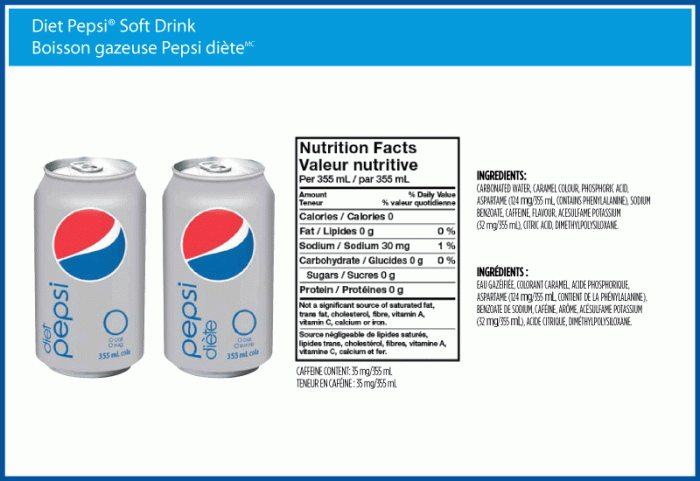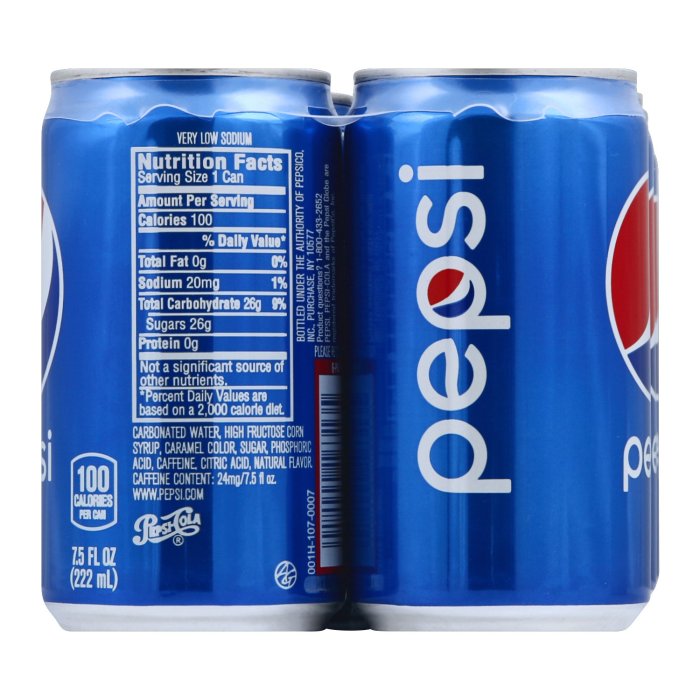Ingredient Analysis: 12 Oz Pepsi Nutrition Facts

12 oz pepsi nutrition facts – Understanding the ingredients in Pepsi provides insight into its flavor profile and potential health effects. The precise formulation can vary slightly depending on location and production batches, but the core components remain consistent.
The following list details the common ingredients found in a 12-ounce can of Pepsi, along with their roles and potential health implications.
Pepsi Ingredients and Their Functions
- Carbonated Water: This forms the base of the beverage, providing fizz and volume. It’s essentially water infused with carbon dioxide, creating the characteristic bubbly texture.
- High Fructose Corn Syrup: This is the primary sweetener, contributing significantly to Pepsi’s sweetness and overall caloric content. High fructose corn syrup is a processed sweetener made from corn starch, and its widespread use has been linked to health concerns, such as weight gain and metabolic issues.
- Caramel Color: This provides the characteristic brown color of Pepsi. It’s made by heating sugars and is a common food additive. Some studies have raised concerns about potential carcinogenic properties of certain types of caramel coloring, although the levels used in soft drinks are generally considered safe by regulatory agencies. Further research is ongoing.
- Phosphoric Acid: This acts as an acidulant, providing tartness and balancing the sweetness. It also helps to preserve the beverage and control its pH. Excessive phosphoric acid consumption has been associated with potential bone health issues.
- Caffeine: This is a stimulant that contributes to the invigorating effect of Pepsi. It’s a naturally occurring substance found in coffee beans and tea leaves, and in Pepsi, it provides a boost of energy and alertness. Excessive caffeine consumption can lead to anxiety, insomnia, and other negative health effects.
- Citric Acid: Another acidulant that contributes to the overall flavor profile, balancing sweetness and adding a touch of tartness. It’s a naturally occurring acid found in citrus fruits and is generally considered safe.
- Natural Flavors: This is a broad term encompassing a blend of flavor compounds that contribute to the signature Pepsi taste. The exact composition of these flavors is often proprietary information.
- Potassium Citrate: This acts as a buffering agent, helping to maintain the pH balance of the beverage. It also contributes to the overall flavor profile.
- Salt (Sodium Chloride): This enhances the flavor and helps to balance the sweetness and acidity. Excessive sodium intake is linked to high blood pressure and other health concerns.
Potential Health Implications of Regular Consumption
Regular consumption of Pepsi, like other sugar-sweetened beverages, is associated with several potential health risks. The high sugar content contributes to weight gain, increased risk of type 2 diabetes, heart disease, and dental problems. The phosphoric acid may contribute to bone loss, and excessive caffeine intake can lead to anxiety and sleep disturbances. It’s important to consume Pepsi, and other sugary drinks, in moderation as part of a balanced diet.
Yo, so you’re checking the 12 oz Pepsi nutrition facts, right? High in sugar, I know, kinda the opposite of a healthy breakfast. But if you’re looking for a protein boost to balance things out, check out the starbucks egg white bites nutrition facts – they’re a pretty solid option. Then you can feel slightly less guilty about that Pepsi later.
Back to those Pepsi facts though, remember to hydrate!
Serving Size and Consumption

A standard serving of Pepsi is typically 12 fluid ounces (355 ml), as indicated on the nutrition label. Understanding this serving size is crucial for managing your daily caloric intake because exceeding recommended daily sugar and calorie limits can negatively impact your health. Regular consumption of multiple servings significantly increases your overall calorie and sugar intake.A 12-ounce can of Pepsi contains approximately 150 calories.
This caloric content, while seemingly modest for a single serving, adds up quickly with increased consumption.
Caloric Content of Multiple Servings
The following illustrates the caloric impact of consuming multiple servings of Pepsi:Imagine a bar graph. The horizontal axis represents the number of servings (1, 2, 3, 4, etc.). The vertical axis represents the total calories consumed. Each bar would represent a different number of servings. For example, the bar representing one serving would reach the 150-calorie mark.
The bar representing two servings would reach the 300-calorie mark (150 calories/serving x 2 servings), and so on. This visual representation clearly shows how quickly the caloric intake rises with each additional serving. For instance, consuming four 12-oz servings would amount to 600 calories, a substantial portion of the daily recommended calorie intake for many individuals.
Recommendations for Mindful Consumption
Maintaining a healthy lifestyle involves mindful consumption of sugary drinks like Pepsi. Limiting your intake to occasional treats rather than daily consumption is a key strategy. Consider these recommendations:Choose water or other unsweetened beverages as your primary drinks. If you do choose Pepsi, limit yourself to one serving per day, or even less frequently. Be aware of hidden calories in other foods and beverages throughout the day, and adjust your intake accordingly to stay within your daily calorie goals.
Consider opting for diet or zero-sugar alternatives if you desire the taste without the substantial calorie and sugar content. Remember that even these alternatives should be consumed in moderation. Paying attention to your body’s hunger and thirst cues can also help regulate your consumption of sugary drinks.
Impact on Health

Regular consumption of Pepsi, like other sugary drinks, can have significant effects on your health, both in the short-term and long-term. Understanding these impacts is crucial for making informed choices about your beverage intake. This section will Artikel the potential health consequences associated with regular Pepsi consumption, emphasizing the importance of moderation.
The high sugar content in Pepsi is the primary driver of many of its potential negative health effects. This section will explore both the immediate and lasting consequences of consuming significant amounts of sugar through beverages like Pepsi.
Short-Term and Long-Term Health Effects of Regular Pepsi Consumption
The following points summarize the potential short-term and long-term health consequences associated with the regular consumption of Pepsi and other sugary drinks. It’s important to remember that individual responses can vary.
- Short-term effects: A sugar rush followed by a crash, leading to feelings of fatigue, irritability, and difficulty concentrating. Increased risk of experiencing digestive issues like bloating and gas due to the high fructose corn syrup content. Temporary spikes in blood sugar levels.
- Long-term effects: Increased risk of weight gain and obesity, contributing to a higher likelihood of developing type 2 diabetes. Elevated risk of cardiovascular disease due to increased blood pressure and cholesterol levels. Increased risk of developing non-alcoholic fatty liver disease (NAFLD). Potential contribution to tooth decay and dental problems due to the high sugar content’s corrosive effect on tooth enamel.
Increased risk of certain types of cancer, such as liver cancer.
Potential Risks Associated with High Sugar Intake
The high sugar content in Pepsi poses several significant health risks. Understanding these risks is essential for making informed decisions about your beverage consumption.
- Weight Gain and Obesity: Sugary drinks like Pepsi provide empty calories, meaning they lack essential nutrients while contributing significantly to overall calorie intake. Excess calorie consumption from these drinks, without corresponding increases in physical activity, readily leads to weight gain and obesity.
- Type 2 Diabetes: The high sugar content in Pepsi can lead to insulin resistance, a condition where the body’s cells become less responsive to insulin, a hormone responsible for regulating blood sugar levels. Over time, this can result in the development of type 2 diabetes.
- Cardiovascular Disease: Studies have linked high sugar intake to increased blood pressure and cholesterol levels, both major risk factors for cardiovascular disease. The high fructose corn syrup in Pepsi is particularly implicated in this risk.
Importance of Moderation and Balanced Consumption, 12 oz pepsi nutrition facts
Moderation and balanced consumption are key to mitigating the potential negative health effects associated with Pepsi consumption. While occasional enjoyment is unlikely to cause significant harm, regular and excessive consumption should be avoided.
Maintaining a balanced diet, rich in fruits, vegetables, and whole grains, and engaging in regular physical activity are crucial for offsetting the potential negative effects of consuming sugary drinks. Consider replacing Pepsi with water, unsweetened tea, or other healthier alternatives to reduce your overall sugar intake. If you choose to consume Pepsi, do so sparingly and as part of an overall healthy lifestyle.
Common Queries
Does Pepsi contain caffeine?
Yes, Pepsi contains caffeine, though the exact amount can vary slightly depending on the production batch.
Are there different versions of Pepsi with varying nutritional content?
Yes, Pepsi offers variations like Diet Pepsi (with artificial sweeteners) and Pepsi Zero Sugar, each with a different nutritional profile.
How does Pepsi compare to other colas in terms of sugar?
Pepsi’s sugar content is comparable to other leading cola brands, though slight variations may exist.
What are the long-term health risks associated with excessive Pepsi consumption?
Excessive consumption can contribute to weight gain, type 2 diabetes, and other health problems due to high sugar and calorie intake.
